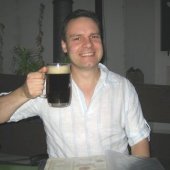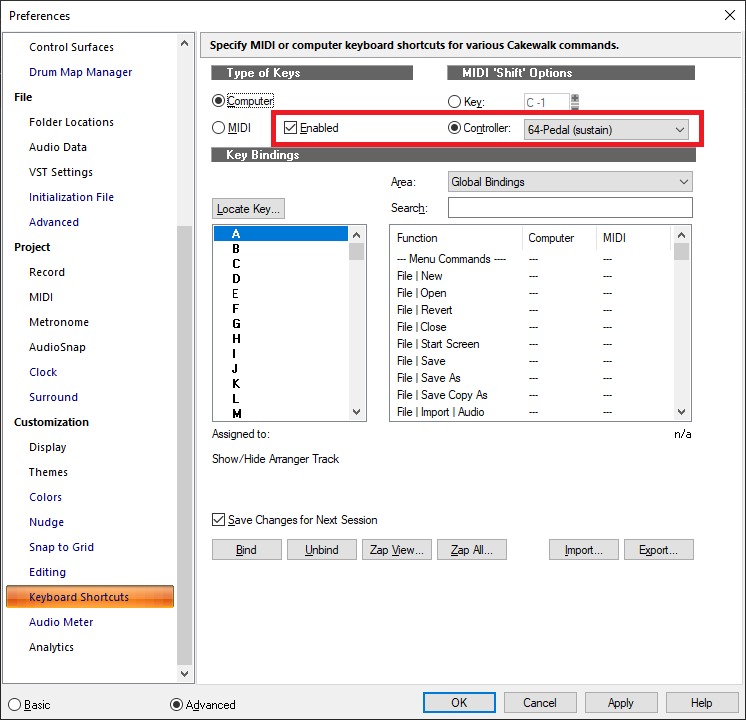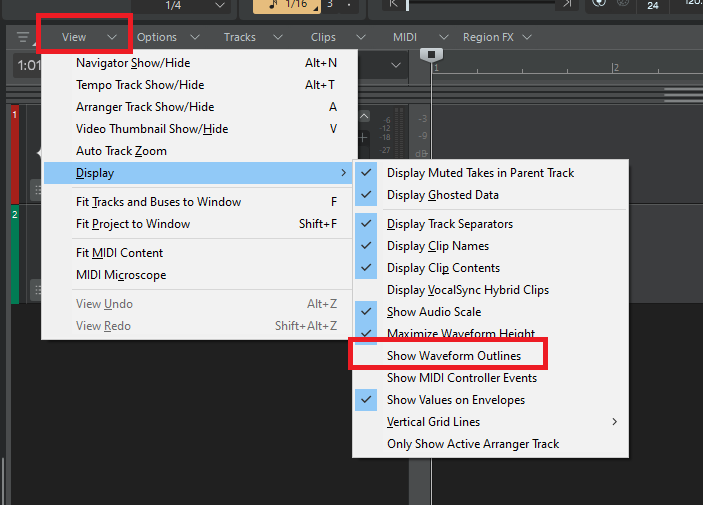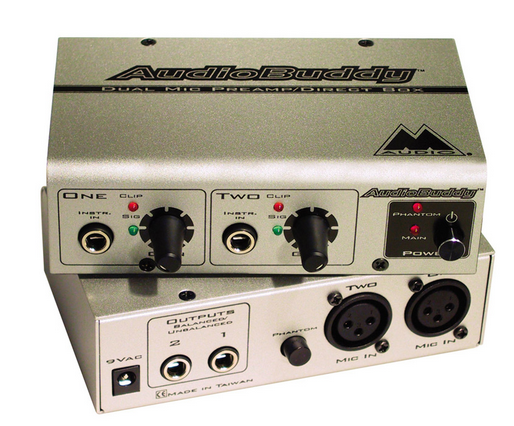-
Posts
7,186 -
Joined
-
Last visited
-
Days Won
39
Everything posted by msmcleod
-
No. Tempo isn't actually automation - it's just shown as an envelope. Automating tempo makes no sense - tempo underpins everything in the engine. Automating it would be like changing your car wheel size while you're driving it.
-

Seeking clarification on purchasing Sonar
msmcleod replied to norfolkmastering's topic in Cakewalk Sonar
Sonar is officially released, and has been for a few months. There is always a continuing beta program as is common with many software products. This allows us to get early feedback on new features / enhancements, and fix any newly introduced issues before it is released to the wider public. -

Sharing your Bandlab masterpiece with other musicians...
msmcleod replied to Dreamer's topic in Cakewalk by BandLab
I still think uploading to BandLab is the best solution. Not only is it free, but you could have the tracks marked as private so you can limit access to each client. -

Looking for solutions for lead sheet with lyrics
msmcleod replied to John S Swanson's topic in Cakewalk by BandLab
You can use MNotepad from Melda Production - it's part of their free plugin collection: -

Experiencing Latency Issues with CbB 2024.07 – Anyone Else?
msmcleod replied to M Ahmad Hanif's topic in Cakewalk by BandLab
It's Windows update time again... I bet Windows is preparing the update in the background... -

Sustain Pedal Issue - CbB 2014.07 Build 108, Roland A-800PRO
msmcleod replied to D_Maynard's topic in Cakewalk by BandLab
The most common reason for this: Best to set the controller to something you're unlikely to use, e.g. 120. If you're not using MIDI events for triggering commands at all, uncheck "Enabled".- 7 replies
-
- cbb
- 2014.07 build 108
-
(and 6 more)
Tagged with:
-
Interesting... zip up your project folder and send it to @Jonathan Sasor... we'll see if we can repro the issue.
-
It might also be worth recomputing the waveform picture... maybe it's gone stale somehow.... Right click on the clip, and pick "Associated Audio Files", then on the dialog select all the files and click "Recompute Pictures"
-
Usually when this error occurs it's either one of the following: 1. Disk is out of space 2. Disk is read-only 3. Disk has errors
-

Audio clip goes into "phantom" mode
msmcleod replied to Cobus Prinsloo's topic in Cakewalk by BandLab
There is more than one way to mute a clip. You can mute the clip itself, but you can also mute the lane. Check both. -
Can you confirm that this doesn't happen with waveform outlining disabled?
-
Looks to my like it's the waveform outline algorithm doing it's thing. The spike is just some waveform detail that is being highlighted at a particular zoom level, and is then "smoothed away" at different zoom levels. Personally, while the waveform outline makes things look a bit prettier, I prefer working with it off for exactly this reason. It's not exactly wrong per se, but it's distracting.
-
If you need a high number of I/O's, a cheaper alternative to the UFX / UCX is the RME DigiFace USB, which goes for around £375 (as opposed to £2,250 for the UFX) and uses exactly the same drivers as the UFX / UCX. It has 4 x ADAT in, 4 x ADAT out and a 1/4" stereo out, so you'll need at least one ADAT converter to get audio into it (e.g. Behringer ADA8200). I'm using 3 x Fostex VC8's, and my old Focusrite 18i20 for my inputs/outputs. This gives me the maximum of 32 inputs and 34 outputs. The advantage of this system, is that you add / upgrade your ADAT converters as and when necessary. What you don't get is the hardware EQ/FX, but having had that before in my Yamaha DS2416 and having to give it up when moved to Windows 64 bit, I find the in-built DSP more of a curse than a blessing once you start relying on it! Also, with regard to multi-client ASIO drivers... be careful here, because it can mean one or both of the following: 1. One ASIO driver can control more than one physical hardware interface. 2. The same ASIO driver can be opened by more than one application at the same time. So double check it can do what you think it can before buying.
-

Make Scroll Lock stop scrolling in Event List
msmcleod replied to Starship Krupa's topic in Feedback Loop
Looks like the code attempted to check for scroll, but another Windows API call was causing it not to work. It's now fixed for the next Sonar update. -
This was fixed in Sonar earlier this month. The issue arises when adjusting the note length causes the clip length to change. In CbB the workaround is to extend the clip length before you change the note length - alternatively just adjust the other notes afterwards. Another method (which I prefer) is to bounce to clip(s) regularly to merge all separate MIDI clips in the track into one.
- 8 replies
-
- 1
-

-
- cakewalk
- piano roll
-
(and 5 more)
Tagged with:
-

Beginner help , still dont have midi playback (correctly).
msmcleod replied to Mike Rothacker's question in Q&A
I use this as a convenient alternative to my Yamaha MU10 / MU100R. Bear in mind though, it's a 32 bit plugin - although it does work with BitBridge, I get better results with JBridge. FWIW, unless the MIDI files were specifically written for a sound canvas, in general I think the syx50 sounds better than the TTS-1 -

[FIXED] 32 bit Instruments and FX In The FX Bin?
msmcleod replied to sjoens's topic in Instruments & Effects
If you've put 32 bit plugin DLL's in your other search paths, then yes. -

Virtually new install - TTS-1 missing already!
msmcleod replied to Digsy's topic in Cakewalk by BandLab
The MT-32 isn't a sound canvas - it's an LA synth module (basically a cut down D50 without a keyboard). It's not even GM - it predates GM. GM borrowed the drum mapping from the MT-32, but that's about it. As a synth, the MT-32 is actually pretty powerful but it's totally lame at emulating any real instruments (with the possible exception of some of the woodwind / percussion instruments). Interestingly, the early MT-32's would actually receive D50 sysex, although anything using samples would sound wrong as the sample sets were different. The samples on the MT-32 are a fraction of a second long, with the sustain parts of the sound being synth based. The sound canvas (which the TTS1 is based on) is totally sample based, which is why it sounds so much better emulating real instruments. -

Using Cakewalk as a pre amp for guitar and mic line imputs
msmcleod replied to Secano SRL's topic in Cakewalk by BandLab
I knew there was something that would do exactly what you need: I've actually got 3 of these on a 1U rack tray in my old 01X / i88X mLAN system. The 01X only has two XLR inputs, with 6 line inputs at the back. Each audiobuddy has two separate mic/instrument ins, so three of them give me mic inputs for the 6 line inputs of the i88X. They're now discontinued, but they do crop up second hand on eBay for around $50. -

Overwriting function doesn't seem to work?
msmcleod replied to Hans Tan's topic in Cakewalk by BandLab
Try checking "Mute Previous Takes" -

How to prevent editing of midi creating multiple clips
msmcleod replied to Roy Slough's question in Q&A
These settings only affect Paste - not drawing new notes in the PRV. -
When you change driver mode from MME to UWP, the device names and their ordering may change - some older MIDI devices that don't support UWP may not appear at all. You need to ensure the order of your devices in UWP mode matches what they were in MME mode. To do this: 1. Switch back to MME 2. Go to the MIDI->Devices tab in preferences, and take a note of the order of your MIDI Output devices - only the ones that are checked matter. 3. Switch to UWP 4. Go to the MIDI->Devices tab in preferences, and set the order of your MIDI Output devices to match what you had in UWP. Start by having them all unchecked, then check the first one - click "Move Checked Output Devices to Top", then check the second one and click "Move Checked Output Devices to Top", and so on.
-

How to prevent editing of midi creating multiple clips
msmcleod replied to Roy Slough's question in Q&A
IIRC, there's a notional "distance" where adding a new note in the PRV will create a new clip, rather than using the existing one. I can't remember exactly what the time distance is, but it looks like this is what you're experiencing. The ability to turn off this behaviour came up in a meeting a few months back, but didn't go any further due to more pressing matters. I'll bring it up again. In the meantime, you could try this.... Instead of drawing the note at the point you want it to start then dragging to the end, try drawing the note starting within or close to the existing clip, drag it out to where you want it to end, then once it's added, adjust the start to where you wanted it to start originally. Because the new note starts within the existing clip, it won't create a new one and will instead just extend the length of the existing clip. Editing the note start won't create a new clip, because the existing clip now covers the time region you want the note in. You should only need to do this for the first note.






